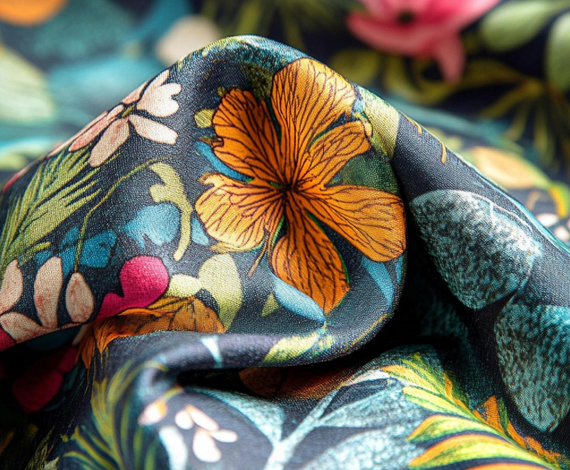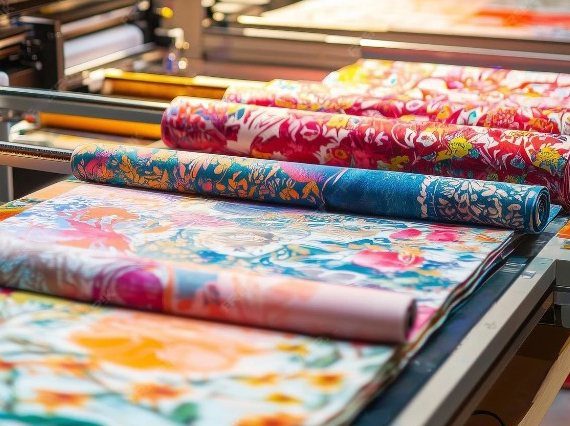When it comes to printing designs on cloth, two terms often pop up — textile printer and fabric printer. If you are new to the printing world, these terms can be confusing. Are they the same? Or is there a clear difference between a textile printer and a fabric printer?
Understanding these differences will help you make the right choice for your printing needs. In this blog, we will explain the difference between a textile printer and a fabric printer in detail. We’ll also guide you on when to use each type of printer and why HGS Machines’ digital textile printing machines are a great choice for businesses and manufacturers.
What is a Textile Printer?
A textile printer is a type of industrial fabric printing machine used to print directly onto textiles or fabrics. Textile printers are widely used in industries such as fashion, home textiles, upholstery, and technical textiles. These machines print continuously on long rolls of fabric and are perfect for bulk printing.
Textiles include woven and knitted materials like cotton, polyester, silk, nylon, and blended fabrics. Textile fabric printing machines can handle a wide range of fabric types. At HGS Machines, our digital textile fabric printing technology delivers high-quality prints, vibrant colors, and sharp detail across multiple fabrics.
How Does a Textile Printer Work?
Modern textile printers use digital inkjet printing or pigment-based technologies to apply patterns and colors directly onto fabric. Designs are sent digitally, and the printer applies ink with precision.
Our pigment based digital fabric printers at HGS Machines use eco-friendly, water-based inks. This reduces waste and supports sustainable production, unlike traditional methods like screen printing.
What is a Fabric Printer?
A fabric printer also prints on fabric but usually refers to machines used for smaller-scale or customized printing jobs. These are ideal for designers, boutique businesses, or those producing fabric samples and prototypes. Fabric printers typically work on pre-cut fabric pieces rather than large fabric rolls. They are cost-effective for small-batch printing and perfect for testing new ideas.
Why the Confusion?
Both fabric printers and textile printers serve the purpose of printing on cloth. But the key difference lies in their use case:
Textile printers = industrial, large scale, high speed Fabric printers = custom, small scale, creative work
Choosing the right machine depends on your production scale, budget, and business goals
Benefits of Using a Textile Printer
High Productivity
Industrial fabric printers can print on long rolls non-stop, increasing efficiency.
Cost-Effective for Bulk Orders
The fabric printing machine cost per unit drops significantly with bulk production.
Wide Fabric Compatibility
Textile digital printing on fabric supports cotton, polyester, silk, nylon, and blends.
Eco-Friendly Printing
Many use water-based inks that are better for the environment.


Understanding the difference between a textile printer and a fabric printer can save your business time and money. If you're printing in bulk, choose a textile printing machine. For low volume, go with a fabric printer.
Get in Touch
Want to learn more? Contact HGS Machines for a free quote. We’ll help you choose the right fabric printing equipment based on your production goals and budget.
Looking for textile printing near me? Reach out now and start your journey with HGS Machines.
FAQ
What is the main difference between a textile printer and a fabric printer?
Textile printers are designed for large-scale fabric printing, while fabric printers are used for smaller batches or samples.
Can a textile printer print on all types of fabric?
Yes, textile printers can print on various fabrics like cotton, polyester, silk, and blends.
Are fabric printers suitable for custom designs?
Yes, fabric printers are ideal for small runs and custom fabric printing.
Which printer is better for bulk production?
Textile printers are better suited for high-volume, continuous fabric printing.
Does HGS Machines offer eco-friendly printing options?
Yes, HGS Machines use water-based, eco-friendly inks in their textile printers.


